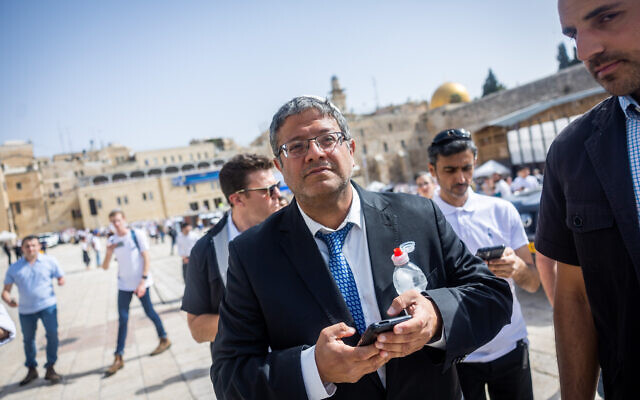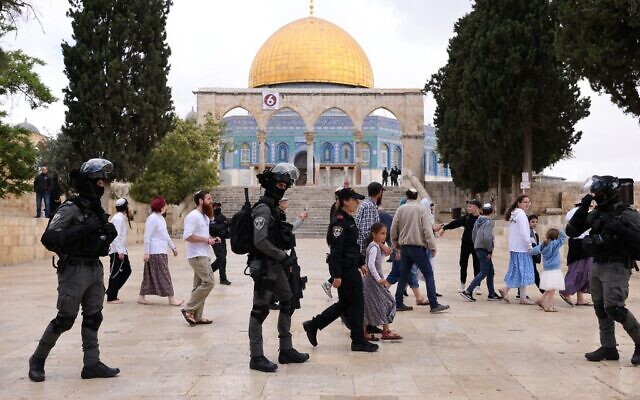‘We mustn’t give in to terror,’ says firebrand lawmaker on Tisha B’Av visit, as police aim to prevent escalation at flashpoint Jerusalem site during Israeli operation in Gaza

Far-right MK Itamar Ben Gvir announced Saturday evening that he would visit the Temple Mount on Sunday morning to mark the Jewish mourning day of Tisha B’Av, potentially exacerbating the already significant tensions at the contested Jerusalem holy site amid deadly fighting between Israel and the Palestinian Islamic Jihad terror group in the Gaza Strip.
Ben Gvir, who prayed Saturday evening at the Western Wall, said his visit had been coordinated a week earlier with the Israel Police and the Knesset Guard, insisting that soaring tensions following the launch of Operation Breaking Dawn would not change his plans.
“We must not give in to jihad and terror, we are the owners of the State of Israel and the more we feel and act accordingly, the more our enemies will understand the message,” Ben Gvir said in a statement.
Ben Gvir, an extremist Knesset member from the Religious Zionism party, made his most recent controversial visit to the Temple Mount late in late May, on Jerusalem Day.
Ben Gvir’s planned Sunday visit was reportedly discussed at a meeting held Saturday night by Public Security Minister Omer Barlev, and also at the top-level security cabinet meeting chaired by Prime Minister Yair Lapid.
As of Saturday night, Hebrew media reported, a senior official in Lapid’s office said the “Tisha B’Av events are planned to be held normally.”
הגעתי כעת לכותל, שריד בית מקדשנו, לקונן על חורבן הבית ולהתפלל לשלומם של תושבי הדרום המותקף ולהצלחתם של חיילי צה"ל הגיבורים שלנו. pic.twitter.com/QFOmgSzfqX
— איתמר בן גביר (@itamarbengvir) August 6, 2022
MK Gaby Lasky of the coalition’s left-wing Meretz party commented on Twitter that Ben Gvir’s visit should be blocked “to prevent an escalation and provocation that could lead to a dangerous explosion [of tensions].”
The Temple Mount is the holiest place for Jews, as the site of the biblical temples, and the compound’s Al-Aqsa Mosque is the third holiest shrine in Islam, turning the area into a major flashpoint in the Israeli-Palestinian conflict. The site is administered by the Waqf, a religious trust run and funded by Jordan.
Under an increasingly frayed arrangement known as the status quo, Jews are generally allowed to visit the Temple Mount during limited hours and on a brief, predetermined route, but not pray there, perform other acts of worship or carry items related to such worship.
Jordanian Foreign Minister Ayman Safadi warned UN Mideast envoy Tor Wennesland Saturday that Israeli “provocations” should be prevented at the Temple Mount on Sunday.
Also stressed to UN envoy @TWennesland urgency of preventing any Israeli provocations at #AlAqsa tomorrow to avoid further escalation. Historical & legal status quo must be respected. Ending escalation & restoring calm must be a global priority. It is in the interest of all 2/2
— Ayman Safadi (@AymanHsafadi) August 6, 2022
Police were deployed in force in Jerusalem, and particularly in the area of the Old City and the Temple Mount, to secure services of the Tisha B’Av fast day amid the flare-up in Gaza.
The fast begins Saturday evening, lasts until Sunday evening, and is expected to draw high Jewish traffic to the Western Wall and Temple Mount.
Public Security Minister Omer Barlev met with top police brass Saturday to discuss preparations, saying “police’s main mission is to maintain calm within the country and to ensure that all emergency instructions in the south are adhered to.”
“Police will also be deployed in points throughout Jerusalem for Tisha B’Av to ensure public safety,” he said.

Earlier this week, prior to the outbreak of violence in Gaza, a Channel 12 report said political and security decision-makers were concerned about violence on the Temple Mount during the fast day. Previous Tisha B’Avs have seen over 1,000 Jewish pilgrims visiting the flashpoint site that has been at the center of repeated rounds of Israeli-Palestinian violence in recent months and years.
Israel doesn’t view such visits as a violation of the status quo, but Palestinians view such large numbers of Jewish visitors as itself a status quo violation.
The uptick in Jewish visitors has not just taken place on Tisha B’Av but throughout the entire year, as public opinion has shifted — particularly in the national religious camp — in support of the practice.
Visits by Jews have also increasingly featured prayers — sometimes in a quorum, but more often by individuals. Such conduct used to be prohibited by Israel Police accompanying Jewish visitors through the site, but footage in recent years has shown officers allowing the often quiet prayers to continue in what Palestinians claim has demonstrated a further deterioration of the status quo.
As reported by The Times of Israel
